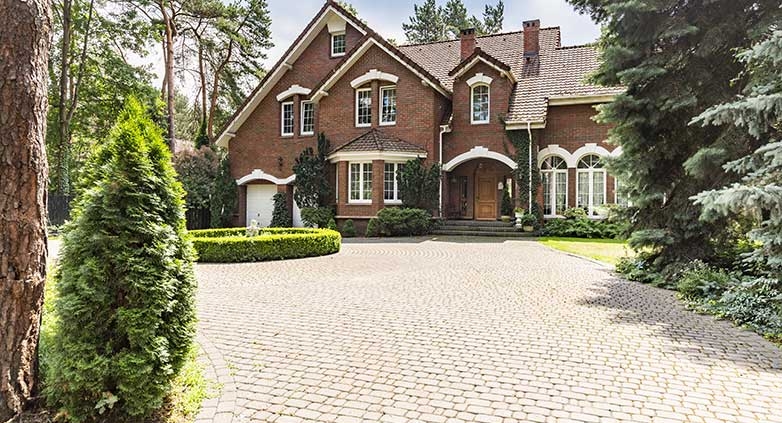Alternative Driveway Materials – 15 Unique Options to Pick
Choosing the right material for your driveway is a crucial decision that can significantly impact the aesthetics, functionality, and value of your property. These alternatives offer homeowners the opportunity to customize their driveways according to specific preferences, environmental considerations, and budget constraints.
Alternative Driveway Materials:
- Gravel
- Concrete
- Asphalt
- Brick
- Pavers
- Grass
- Shell
- Permeable Pavers
- Recycled Material
- Block Paving
- Tar and Chip
- Resin-Bound
- Pervious Concrete
- Crushed Concrete
- Cobblestone
Each material brings its unique set of benefits, from environmental sustainability to aesthetic versatility, making it essential to weigh the pros and cons tailored to individual needs and preferences.
1. Gravel
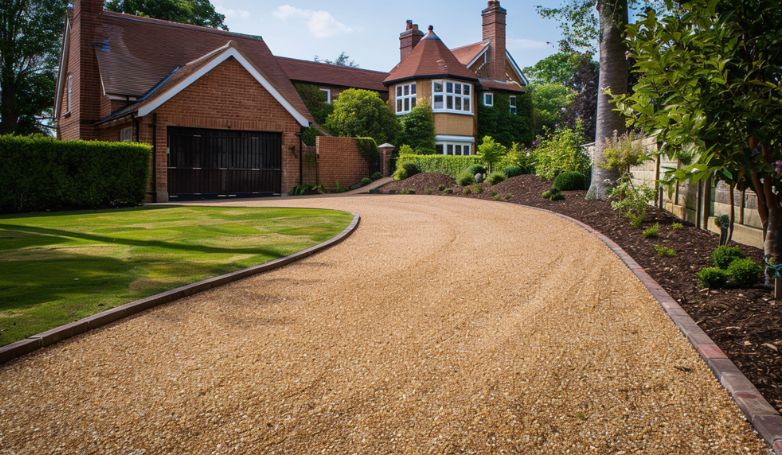
Gravel driveways offer an economical and flexible solution for homeowners.
Unlike rigid pavement types, gravel allows for water drainage, reducing runoff and supporting eco-friendly landscaping.
Its installation and maintenance costs are significantly lower than those of concrete or asphalt, making it a budget-friendly option. Gravel also provides a natural aesthetic that can enhance the curb appeal of a property. Moreover, it’s easy to repair by simply adding more gravel, thus avoiding the need for extensive resurfacing or replacement.
The variety of gravel sizes and colors available allows for customization, enabling homeowners to tailor their driveway’s appearance to match their home’s style.
2. Concrete
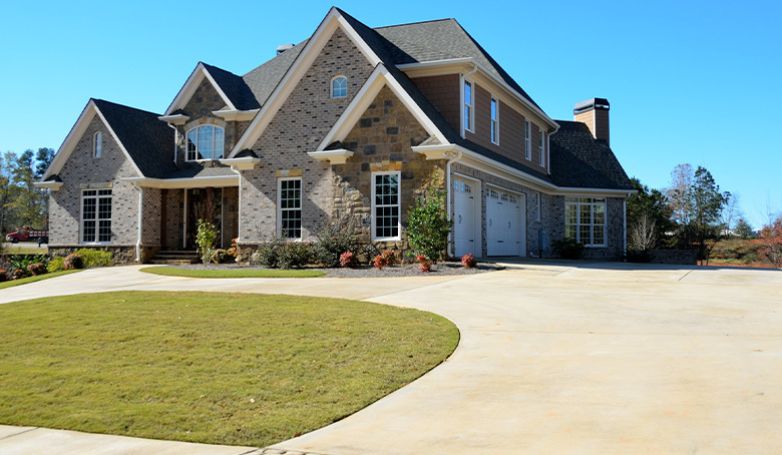
Concrete driveways are highly favored for their durability and longevity, capable of lasting up to 30 years with proper care. This material offers a sleek, clean look that enhances the aesthetic appeal of any property.
Concrete’s versatility allows it to be stamped, colored, or engraved, providing homeowners with a range of design options to personalize their driveway. Additionally, its solid surface withstands heavy loads, making it suitable for areas with frequent vehicle traffic.
Concrete’s reflective properties also contribute to cooler surroundings in hot climates. Despite higher upfront costs, its durability and low maintenance requirements make concrete a cost-effective choice over time.
Now, let’s explore different options for alternative driveway materials.
Read more: Half circle driveway – 30 cutting-edge design ideas
3. Asphalt
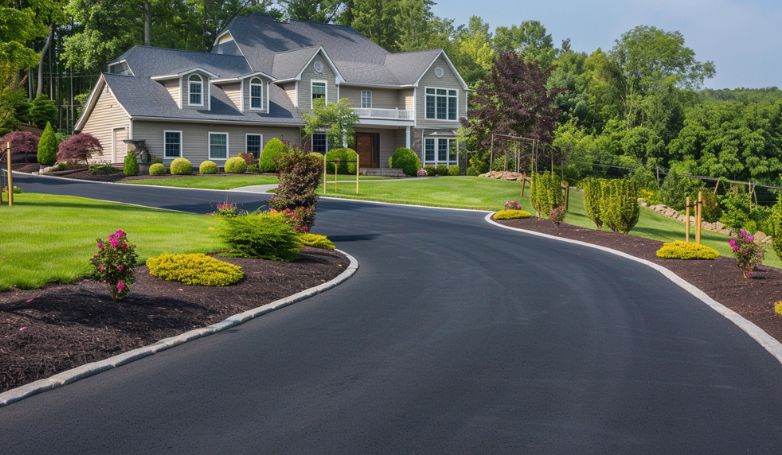
Asphalt driveways are a popular choice due to their cost-effectiveness and quick installation process. Ideal for colder climates, asphalt’s black color absorbs heat, helping to melt snow and ice more efficiently than other materials.
This characteristic makes it a practical option for regions experiencing harsh winters. Asphalt is also flexible, which means it’s less likely to crack under the stress of freeze-thaw cycles. Furthermore, it offers a smooth, continuous surface that provides safe traction for vehicles and pedestrians.
Periodic sealing is required to maintain its condition, but overall, asphalt offers a balance of affordability, durability, and ease of maintenance.
4. Brick
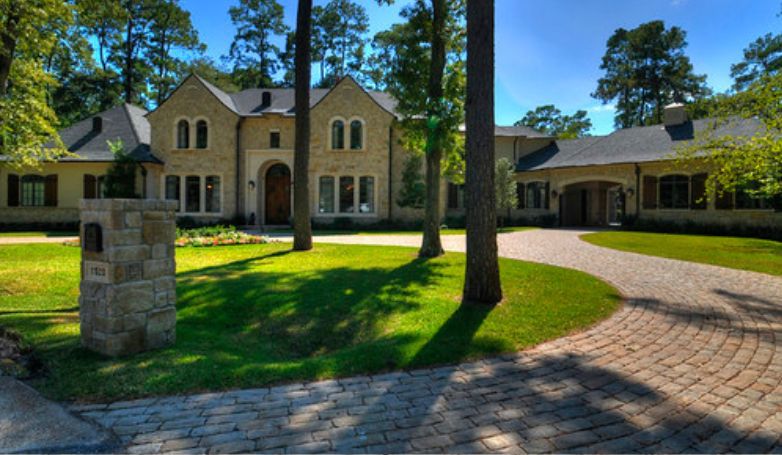
Brick driveways exude a classic elegance and charm that instantly boosts curb appeal and property value. Made from natural clay, bricks offer environmental benefits and are known for their durability, withstanding heavy loads and traffic without significant damage.
The color of brick driveways does not fade over time, ensuring a vibrant entrance for years. Additionally, bricks are available in various colors, shapes, and patterns, allowing for extensive customization options.
While the initial investment may be higher than other materials, the longevity and aesthetic appeal of a brick driveway can outweigh the cost, making it a worthwhile consideration for homeowners seeking a timeless look.
5. Pavers
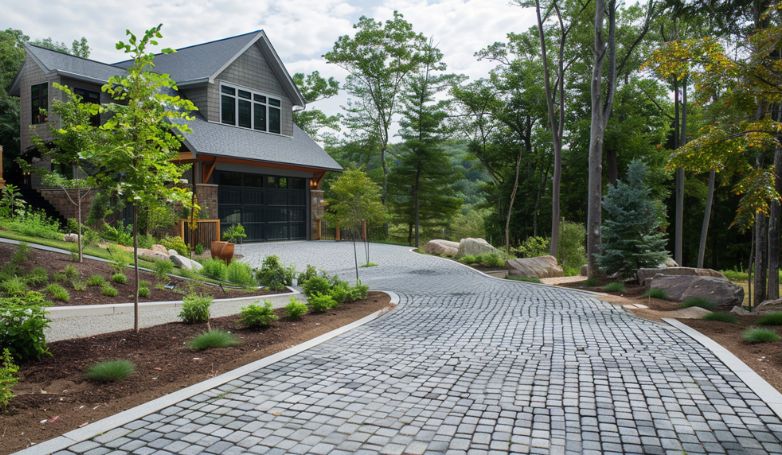
Paver driveways provide unparalleled aesthetic appeal and versatility, with a wide array of materials, colors, textures, and patterns available. They offer excellent durability and can withstand heavy vehicular traffic without cracking, thanks to their interlocking design.
Pavers are easy to repair; individual pavers can be replaced without disturbing the surrounding area, ensuring a consistently attractive appearance. This material also promotes better drainage compared to traditional concrete or asphalt surfaces.
Although the initial cost of pavers may be higher, their longevity, ease of maintenance, and potential to increase property value make them a sound investment for homeowners seeking both functionality and style.
6. Grass
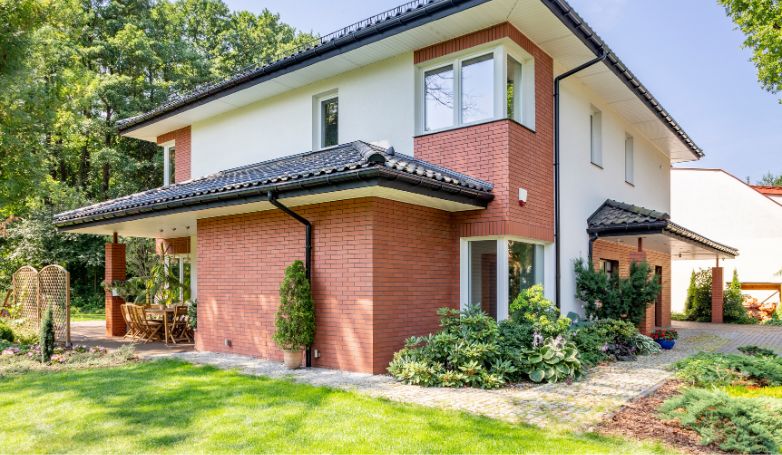
Grass driveways represent a sustainable and visually appealing alternative, seamlessly blending the driveway with the surrounding landscape.
By using grass pavers or a grid system, vehicles can park without harming the underlying grass, combining the functionality of a traditional driveway with the aesthetics of a green lawn. This approach encourages rainwater infiltration into the soil, reducing runoff and promoting groundwater recharge.
Grass driveways can significantly lower surface temperatures around your home, mitigating the urban heat island effect. Though requiring more maintenance than hard surfaces, grass driveways offer an eco-friendly solution that enhances the ecological value and beauty of your property.
Next, we’ll examine alternative choices for alternative driveway materials.
7. Shell
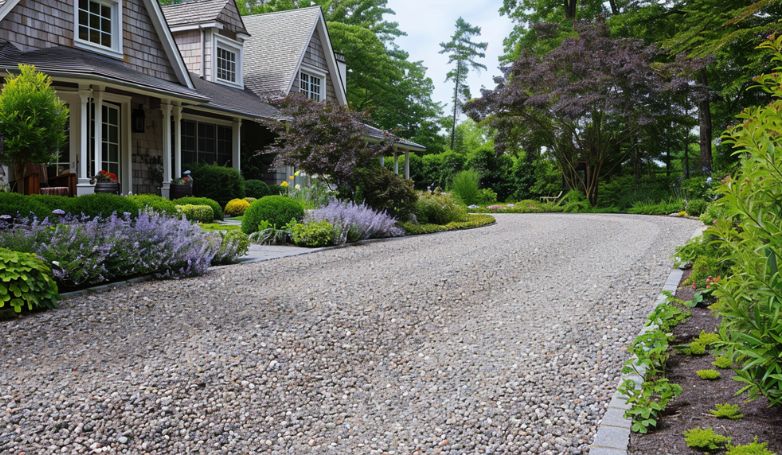
Shell driveways, made from crushed shells of clams, oysters, and scallops, are an environmentally friendly choice that provides a unique, coastal aesthetic. The natural white or off-white color of the shells brightens up the driveway area and reflects sunlight, reducing heat absorption.
Shells naturally interlock and compact over time, creating a stable yet permeable surface that allows for effective drainage, minimizing puddles and runoff. As an added benefit, shell driveways can gradually release beneficial minerals into the soil.
This option is especially appealing for properties near the coast, offering durability and a distinct, natural look that complements seaside landscapes.
8. Permeable Pavers
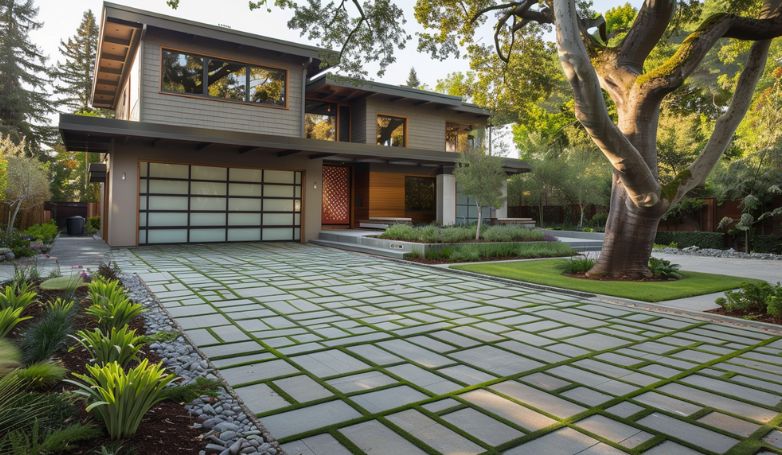
Permeable pavers are an innovative solution designed to combat drainage and runoff issues, making them an ideal choice for environmentally conscious homeowners.
These pavers allow water to filter through the surface and into the ground or a specially prepared sub-base, reducing erosion and replenishing groundwater supplies. By mitigating stormwater runoff, permeable pavers help reduce the risk of flooding and pollution.
Available in various materials, shapes, and colors, they offer aesthetic flexibility and can be arranged in unique patterns to enhance the curb appeal of any property. Although initial costs may be higher, the long-term environmental and drainage benefits justify the investment.
9. Recycled Material
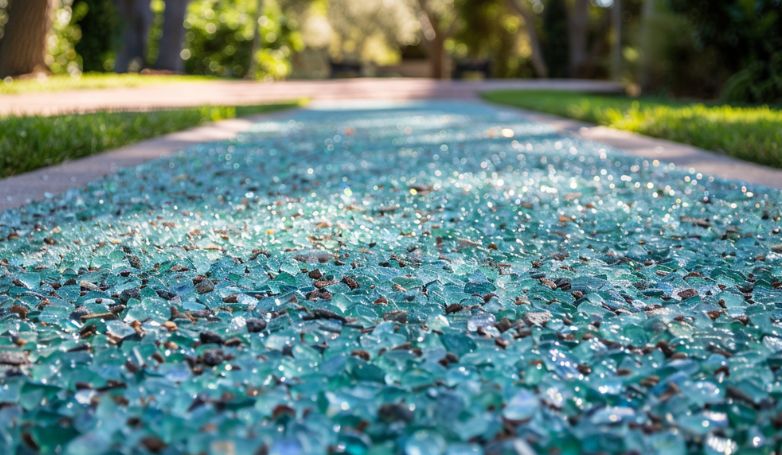
Driveways constructed from recycled materials, such as crushed glass, rubber, or plastic, offer an eco-friendly and creative alternative to traditional driveway options.
These materials reduce landfill waste by repurposing discarded items into functional, durable surfaces. Recycled material driveways can be both eye-catching and environmentally responsible, providing unique textures and colors not found in natural stone or concrete driveways.
Additionally, they often feature excellent drainage properties and can be more resistant to cracking and shifting. Opting for a driveway made from recycled materials supports sustainability efforts while giving your property a distinctive and conversation-worthy feature.
10. Block paving
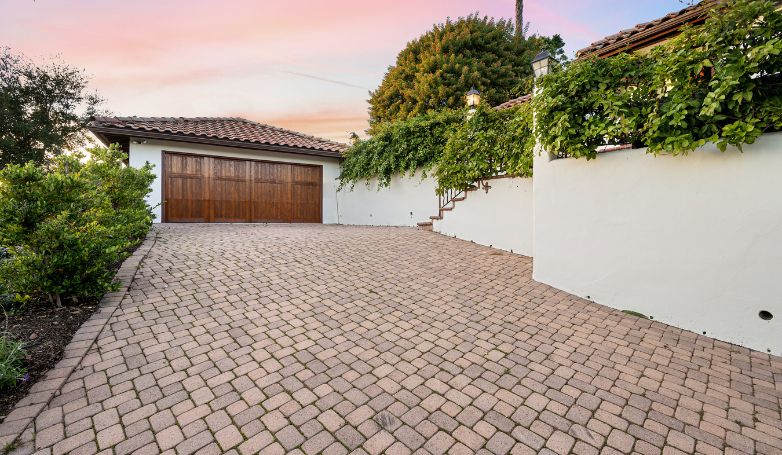
Block paving driveways are highly customizable and durable, offering a range of colors, shapes, and patterns to create a unique and visually appealing entrance to your home.
The individual blocks can be lifted and replaced if damage occurs, making repairs simpler and less invasive than with poured surfaces. This modularity also allows for easy access to underground utilities without disrupting the entire driveway. Block paving provides excellent drainage when properly installed, preventing standing water and reducing slip hazards.
Though the initial installation may be more labor-intensive, the long-term benefits of aesthetic appeal, durability, and easy maintenance make block paving a versatile and practical choice.
Moving on, we can consider various materials for alternative driveway materials.
11. Tar and Chip
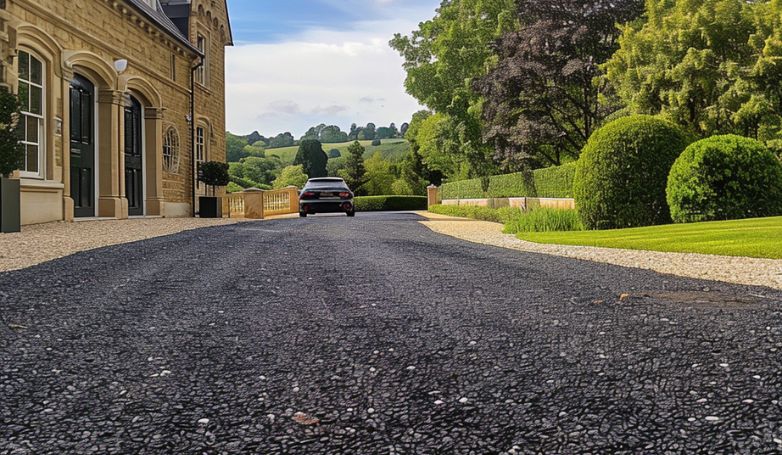
Tar-and-chip driveways, also known as chip-and-seal or seal chip, offer a rustic, textured alternative to smooth asphalt or concrete surfaces.
This method involves laying a hot tar foundation, followed by a layer of crushed stone that is compacted into the tar. The result is a driveway with improved traction and a natural, gravel-like appearance without the maintenance of loose gravel. Tar-and-chip driveways are cost-effective, requiring less material and labor than traditional asphalt.
They also provide excellent durability and a customizable look through the choice of stone color, catering to homeowners seeking a balance between aesthetics and functionality.
12. Resin-bound
Resin-bound driveways are becoming increasingly popular due to their attractive finish and permeability, which allows water to drain through, reducing puddles and runoff.
This system mixes natural aggregate, marble, or recycled glass with a clear resin to form a strong, durable surface that can withstand heavy traffic. The seamless finish of a resin-bound driveway is available in various colors and patterns, offering great flexibility in design to complement any home style.
Moreover, resin-bound surfaces are low maintenance, resistant to weeds, and UV stable, ensuring that the color does not fade over time, making it a practical and visually appealing choice.
13. Pervious concrete
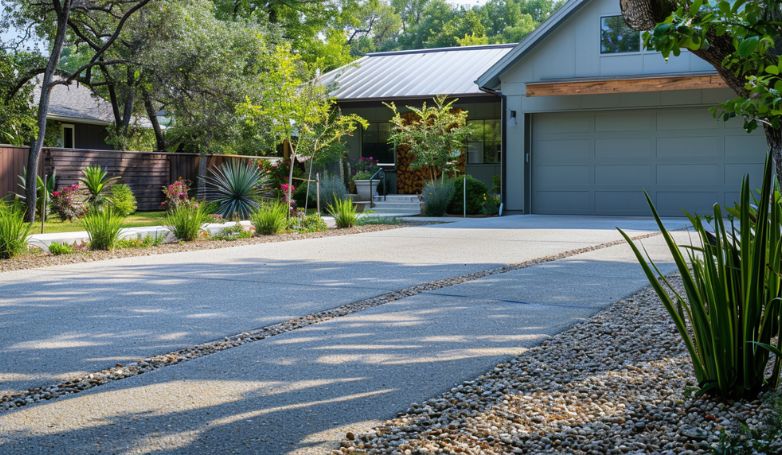
Pervious concrete is an innovative material designed to address runoff issues by allowing water to permeate through the surface into the ground below.
This feature makes it an environmentally friendly option, reducing the need for stormwater management systems and mitigating flooding risks. Pervious concrete is ideal for homeowners concerned with sustainable landscaping and water conservation.
Although it may have a higher initial cost, its long-term benefits include reducing the heat island effect and replenishing local aquifers. Its rough texture also provides natural filtration, improving water quality, making it a responsible choice for eco-conscious property owners.
Let’s investigate additional options for alternative driveway materials.
14. Crushed concrete
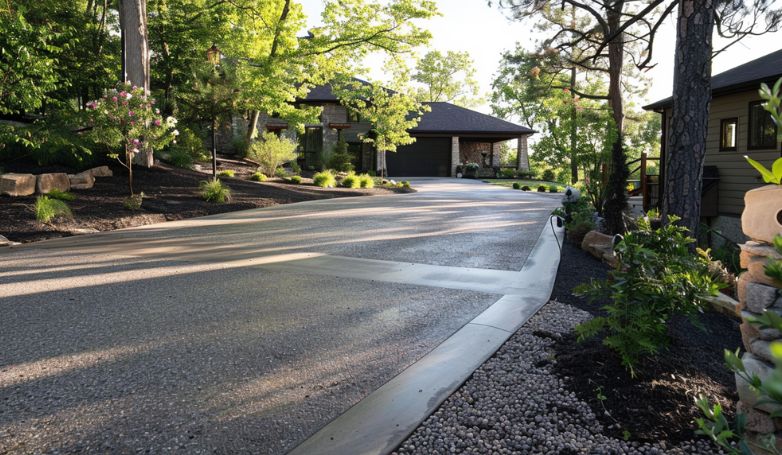
Crushed concrete, repurposed from demolished structures, is a sustainable and cost-effective material for driveways. It offers a similar level of durability and performance as traditional gravel, with the added benefit of being eco-friendly.
Using crushed concrete helps reduce waste in landfills and the demand for new materials. Its rugged texture provides good traction, while its ability to compact under weight creates a stable surface suitable for vehicle traffic.
The versatility of crushed concrete, capable of fitting various landscape designs, makes it an appealing option for homeowners looking to combine practicality with environmental responsibility.
15. Cobblestone
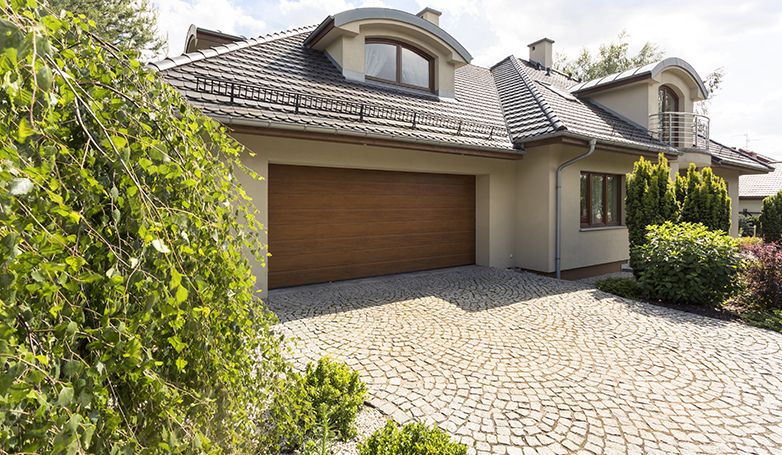
Cobblestone driveways evoke timeless elegance and historical charm, significantly enhancing a property’s curb appeal and value. Made from natural stone, cobblestones are extremely durable, capable of lasting centuries with minimal maintenance.
Their unique texture offers excellent traction in all weather conditions, making them a safe option for sloped driveways. Cobblestones are environmentally friendly, as they allow water to percolate between the stones, reducing runoff and promoting natural groundwater recharge.
While the initial cost can be higher, the longevity, aesthetic appeal, and potential increase in property value make cobblestone driveways a worthwhile investment for those seeking a distinctive and luxurious entrance.
Considerations When Choosing an Alternative Driveway Material
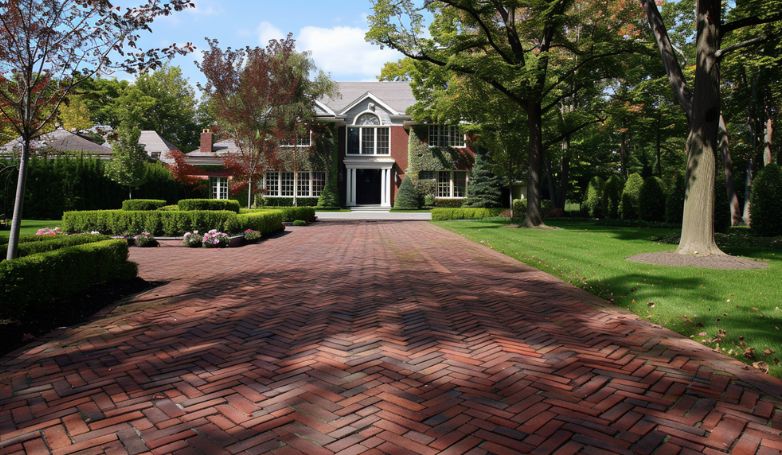
Choosing the right alternative driveway material involves several key considerations that can influence both the functionality and aesthetics of your driveway. Here are the most crucial factors to weigh in your decision-making process:
Aesthetic Appeal
When selecting an alternative driveway material, consider how it complements your home’s architectural style and landscape design. The material’s color, texture, and pattern should enhance your property’s overall appearance, creating a welcoming entrance. Aesthetic appeal can significantly impact curb appeal and, consequently, property value, making it crucial to choose a material that aligns with your aesthetic preferences and the character of your home.
Climate
The climate in your area plays a significant role in determining the suitability of a driveway material. Materials must withstand local weather conditions, whether it’s freezing temperatures, heavy rainfall, or extreme heat. For instance, permeable options like gravel or pervious concrete are ideal in areas prone to heavy rain, while asphalt’s heat absorption is beneficial in cold climates for snow melt.
Durability and Maintenance
Evaluate the longevity and maintenance requirements of each material. Some materials, like cobblestone or concrete, offer decades of durability with minimal upkeep, while others, such as gravel, may need regular replenishment. Consider the material’s resistance to wear and tear, its ability to handle vehicle traffic, and the frequency and cost of maintenance tasks to ensure it meets your long-term needs.
Cost
Cost encompasses not only the initial installation but also long-term maintenance and potential replacement expenses. Budget-friendly options like crushed concrete can offer savings upfront, while investments in materials like resin or cobblestone can provide value over time through durability and low maintenance. Assess your budget, considering both immediate and future costs, to choose a material that offers the best value and aligns with your financial plan.
FAQs about alternative driveway materials
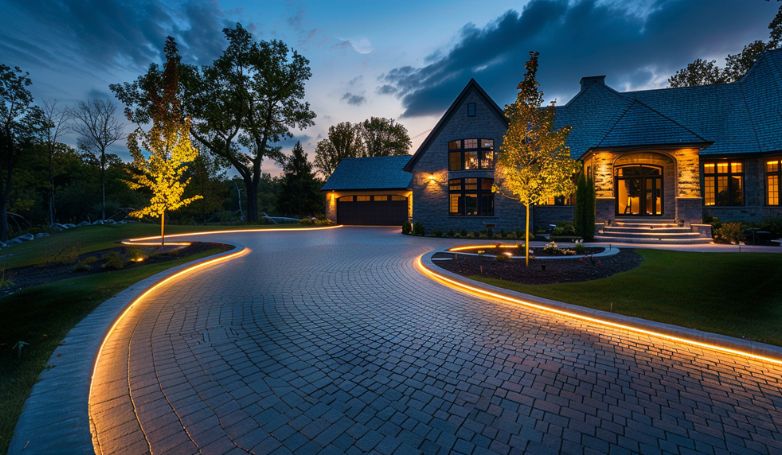
When exploring alternative driveway materials, several common questions arise regarding cost, practicality, and durability. Here are answers to some frequently asked questions:
What is the cheapest option for a driveway?
Gravel is often considered the cheapest option for a driveway. It’s relatively inexpensive to purchase and install, making it a budget-friendly choice for covering large areas.
What is the most practical driveway?
Asphalt is deemed the most practical driveway material for many due to its durability, cost-effectiveness, and ease of repair. It’s particularly beneficial in colder climates due to its ability to expand and contract without cracking.
What is the cheapest alternative to concrete driveways?
Crushed concrete, also known as recycled concrete aggregate, is a cheaper alternative to traditional concrete driveways. It provides a similar aesthetic and durability at a lower cost.
What is the longest lasting driveway material?
Cobblestone and pavers are among the longest-lasting driveway materials. When properly installed and maintained, they can last for decades or even centuries, offering a durable and timeless appeal.
Conclusion
In conclusion, selecting an alternative driveway material involves balancing aesthetics, climate resilience, durability, and cost to meet your specific needs and preferences. Whether you opt for the eco-friendly permeability of gravel, the classic appeal of cobblestone, or the cost-effectiveness of crushed concrete, each material offers unique advantages. By carefully considering these key factors, homeowners can choose a driveway solution that not only enhances their property’s curb appeal but also provides long-lasting functionality and value.

